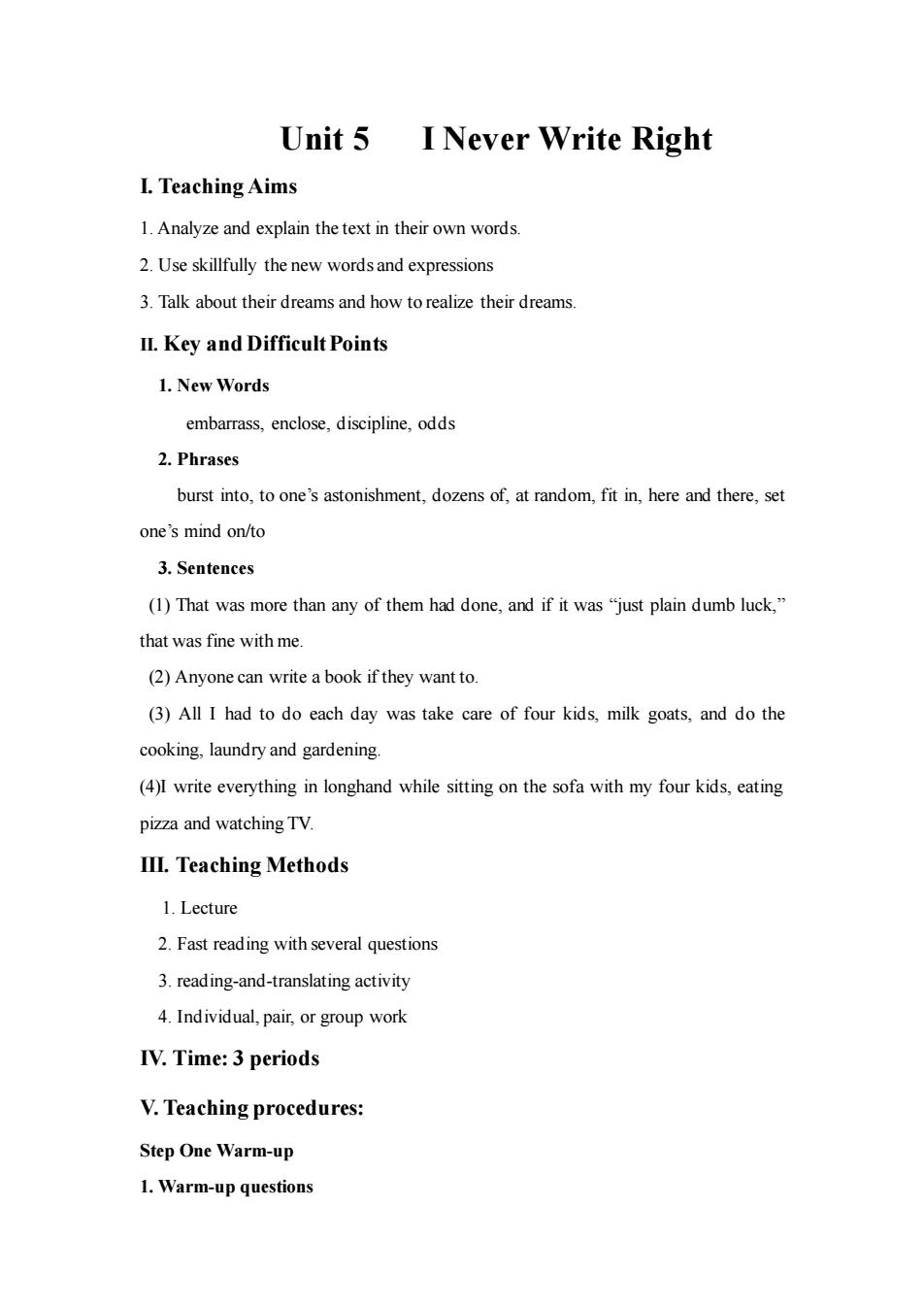
Unit 5 I Never Write Right I.Teaching Aims 1.Analyze and explain the text in their own words 2.Use skillfully the new wordsand expressions 3.Talk about their dreams and how to realize their dreams. I.Key and Difficult Points 1.New Words embarrass,enclose,discipline,odds 2.Phrases burst into,to one's astonishment,dozens of,at random,fit in,here and there,set one's mind on/to 3.Sentences (1)That was more than any of them had done,and if it was"just plain dumb luck," that was fine with me. (2)Anyone can write a book if they want to. (3)All I had to do each day was take care of four kids,milk goats,and do the cooking.laundry and gardening. (4)I write everything in longhand while sitting on the sofa with my four kids,eating pizza and watching TV. III.Teaching Methods 1.Lecture 2.Fast reading with several questions 3.reading-and-translating activity 4.Individual,pair,or group work IV.Time:3 periods V.Teaching procedures: Step One Warm-up 1.Warm-up questions
Unit 5 I Never Write Right I. Teaching Aims 1. Analyze and explain the text in their own words. 2. Use skillfully the new words and expressions 3. Talk about their dreams and how to realize their dreams. II. Key and Difficult Points 1. New Words embarrass, enclose, discipline, odds 2. Phrases burst into, to one’s astonishment, dozens of, at random, fit in, here and there, set one’s mind on/to 3. Sentences (1) That was more than any of them had done, and if it was “just plain dumb luck,” that was fine with me. (2) Anyone can write a book if they want to. (3) All I had to do each day was take care of four kids, milk goats, and do the cooking, laundry and gardening. (4)I write everything in longhand while sitting on the sofa with my four kids, eating pizza and watching TV. III. Teaching Methods 1. Lecture 2. Fast reading with several questions 3. reading-and-translating activity 4. Individual, pair, or group work IV. Time: 3 periods V. Teaching procedures: Step One Warm-up 1. Warm-up questions
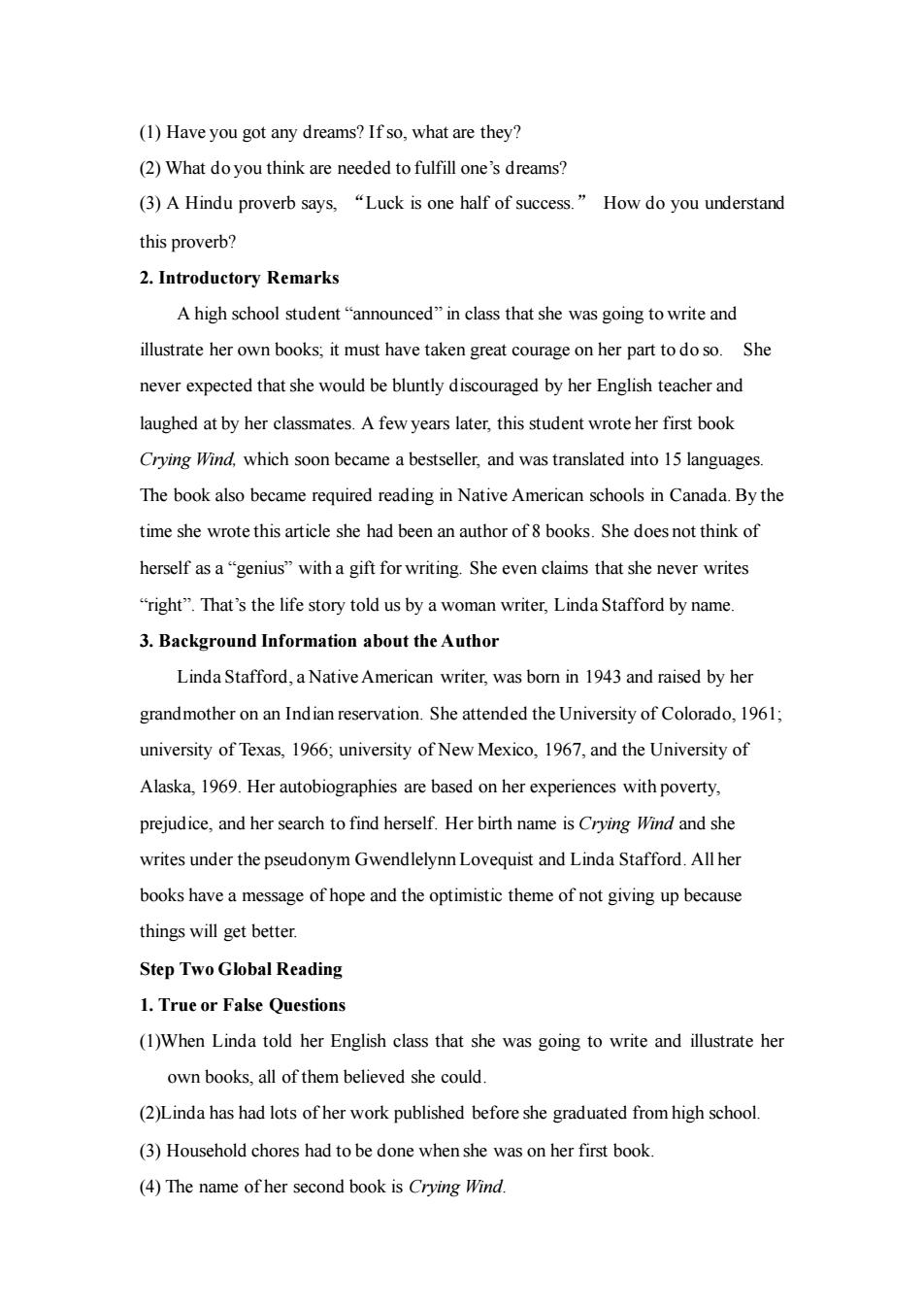
(1)Have you got any dreams?Ifso,what are they? (2)What do you think are needed to fulfill one's dreams? (3)A Hindu proverb says,"Luck is one half of success."How do you understand this proverb? 2.Introductory Remarks A high school student"announced"in class that she was going to write and illustrate her own books,it must have taken great courage on her part to do so. She never expected that she would be bluntly discouraged by her English teacher and laughed at by her classmates.A few years later,this student wrote her first book Crying Wind.which soon became a bestseller,and was translated into 15 languages The book also became required reading in Native American schools in Canada.By the time she wrote this article she had been an author of books.She does not think of herself as a"genius"with a gift for writing.She even claims that she never writes "ight"That's the life story told us by a woman writer,Linda Stafford by name 3.Background Information about the Author Linda Stafford,a Native American writer,was bom in 1943 and raised by her grandmother on an Indian reservation.She attended the University of Colorado,1961; university of Texas,1966;university of New Mexico,1967,and the University of Alaska,1969.Her autobiographies are based on her experiences with poverty, prejudice.and her search to find herself.Her birth name isCrying Wind and she writes under the pseudonym Gwendlelynn Lovequist and Linda Stafford.All her books have a message of hope and the optimistic theme of not giving up because things will get better. Step Two Global Reading 1.True or False Questions (1)When Linda told her English class that she was going to write and illustrate her own books,all of them believed she could. (2)Linda has had lots of her work published before she graduated from high school. (3)Household chores had to be done when she was on her first book (4)The name of her second book is Crying Wind
(1) Have you got any dreams? If so, what are they? (2) What do you think are needed to fulfill one’s dreams? (3) A Hindu proverb says, “Luck is one half of success.” How do you understand this proverb? 2. Introductory Remarks A high school student “announced” in class that she was going to write and illustrate her own books; it must have taken great courage on her part to do so. She never expected that she would be bluntly discouraged by her English teacher and laughed at by her classmates. A few years later, this student wrote her first book Crying Wind, which soon became a bestseller, and was translated into 15 languages. The book also became required reading in Native American schools in Canada. By the time she wrote this article she had been an author of 8 books. She does not think of herself as a “genius” with a gift for writing. She even claims that she never writes “right”. That’s the life story told us by a woman writer, Linda Stafford by name. 3. Background Information about the Author Linda Stafford, a NativeAmerican writer, was born in 1943 and raised by her grandmother on an Indian reservation. She attended the University of Colorado, 1961; university of Texas, 1966; university of New Mexico, 1967, and the University of Alaska, 1969. Her autobiographies are based on her experiences with poverty, prejudice, and her search to find herself. Her birth name is Crying Wind and she writes under the pseudonym Gwendlelynn Lovequist and Linda Stafford. All her books have a message of hope and the optimistic theme of not giving up because things will get better. Step Two Global Reading 1. True or False Questions (1)When Linda told her English class that she was going to write and illustrate her own books, all of them believed she could. (2)Linda has had lots of her work published before she graduated from high school. (3) Household chores had to be done when she was on her first book. (4) The name of her second book is Crying Wind
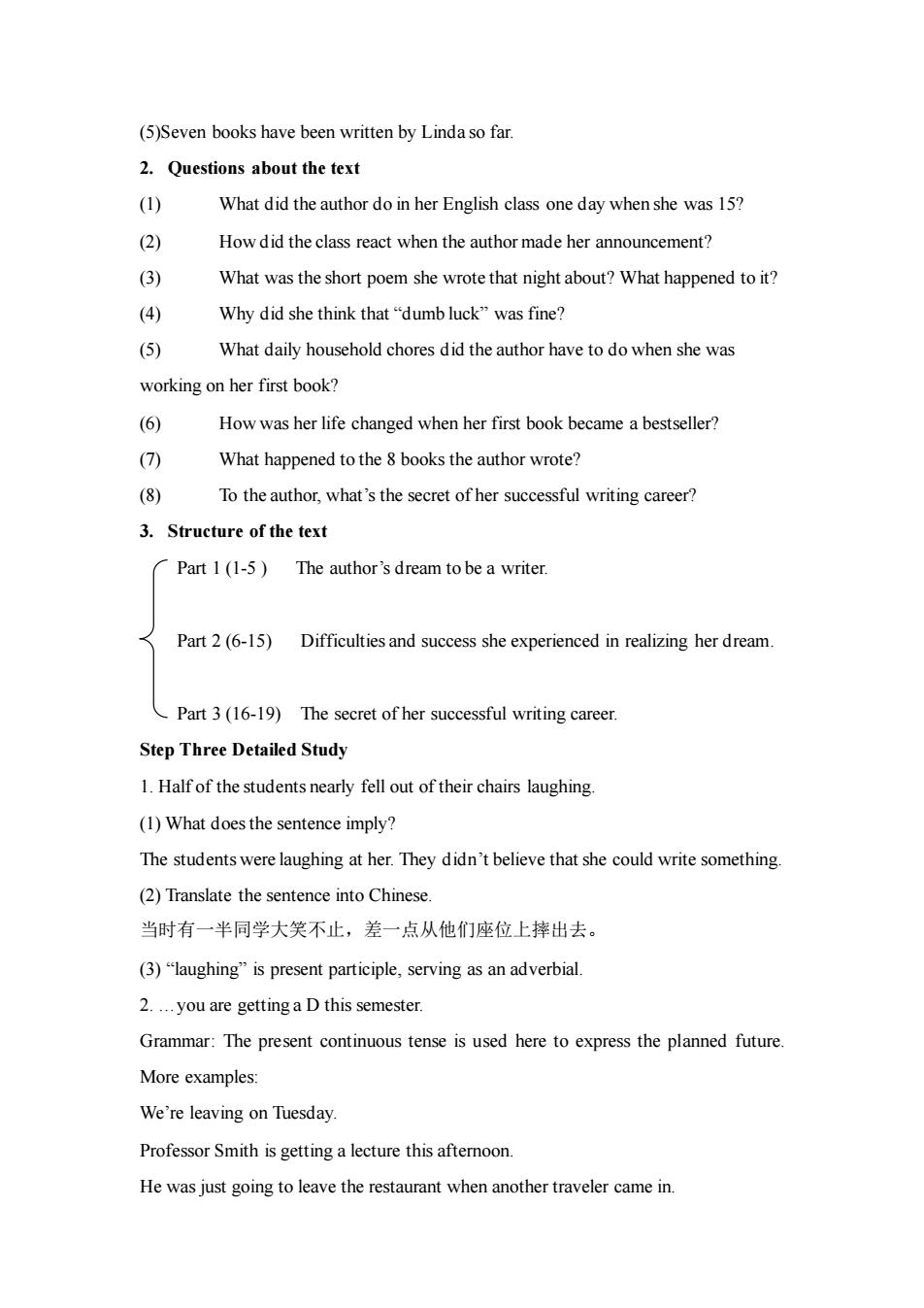
(5)Seven books have been written by Linda so far. 2.Questions about the text (1) What did the author do in her English class one day when she was 15? (2) How did the class react when the author made her announcement? (3) What was the short poem she wrote that night about?What happened to it? (4) Why did she think that"dumb luck"was fine? (5) What daily household chores did the author have to do when she was working on her first book? 6) How was her life changed when her first book became a bestseller? (7 What happened to the books the author wrote? (8) To the author,what's the secret of her successful writing career? 3.Structure of the text Part 1 (1-5)The author's dream to be a writer. Part 2(6-15)Difficulties and success she experienced in realizing her dream. Part 3(16-19)The secret of her successful writing career Step Three Detailed Study 1.Half of the students nearly fell out of their chairs laughing. (1)What doesthe sentence imply? The students were laughing at her.They didn't believe that she could write something (2)Translate the sentence into Chinese. 当时有一半同学大笑不止,差一点从他们座位上摔出去。 (3)"laughing"is present participle,serving as an adverbial. 2..you are gettinga D this semester. Grammar:The present continuous tense is used here to express the planned future. More examples: We're leaving on Tuesday Professor Smith is getting a lecture this aftemoon. He was just going to leave the restaurant when another traveler came in
(5)Seven books have been written by Linda so far. 2. Questions about the text (1) What did the author do in her English class one day when she was 15? (2) How did the class react when the author made her announcement? (3) What was the short poem she wrote that night about? What happened to it? (4) Why did she think that “dumb luck” was fine? (5) What daily household chores did the author have to do when she was working on her first book? (6) How was her life changed when her first book became a bestseller? (7) What happened to the 8 books the author wrote? (8) To the author, what’s the secret of her successful writing career? 3. Structure of the text Part 1 (1-5 ) The author’s dream to be a writer. Part 2 (6-15) Difficulties and success she experienced in realizing her dream. Part 3 (16-19) The secret of her successful writing career. Step Three Detailed Study 1. Half of the students nearly fell out of their chairs laughing. (1) What does the sentence imply? The students were laughing at her. They didn’t believe that she could write something. (2) Translate the sentence into Chinese. 当时有一半同学大笑不止,差一点从他们座位上摔出去。 (3) “laughing” is present participle, serving as an adverbial. 2. …you are getting a D this semester. Grammar: The present continuous tense is used here to express the planned future. More examples: We’re leaving on Tuesday. Professor Smith is getting a lecture this afternoon. He was just going to leave the restaurant when another traveler came in
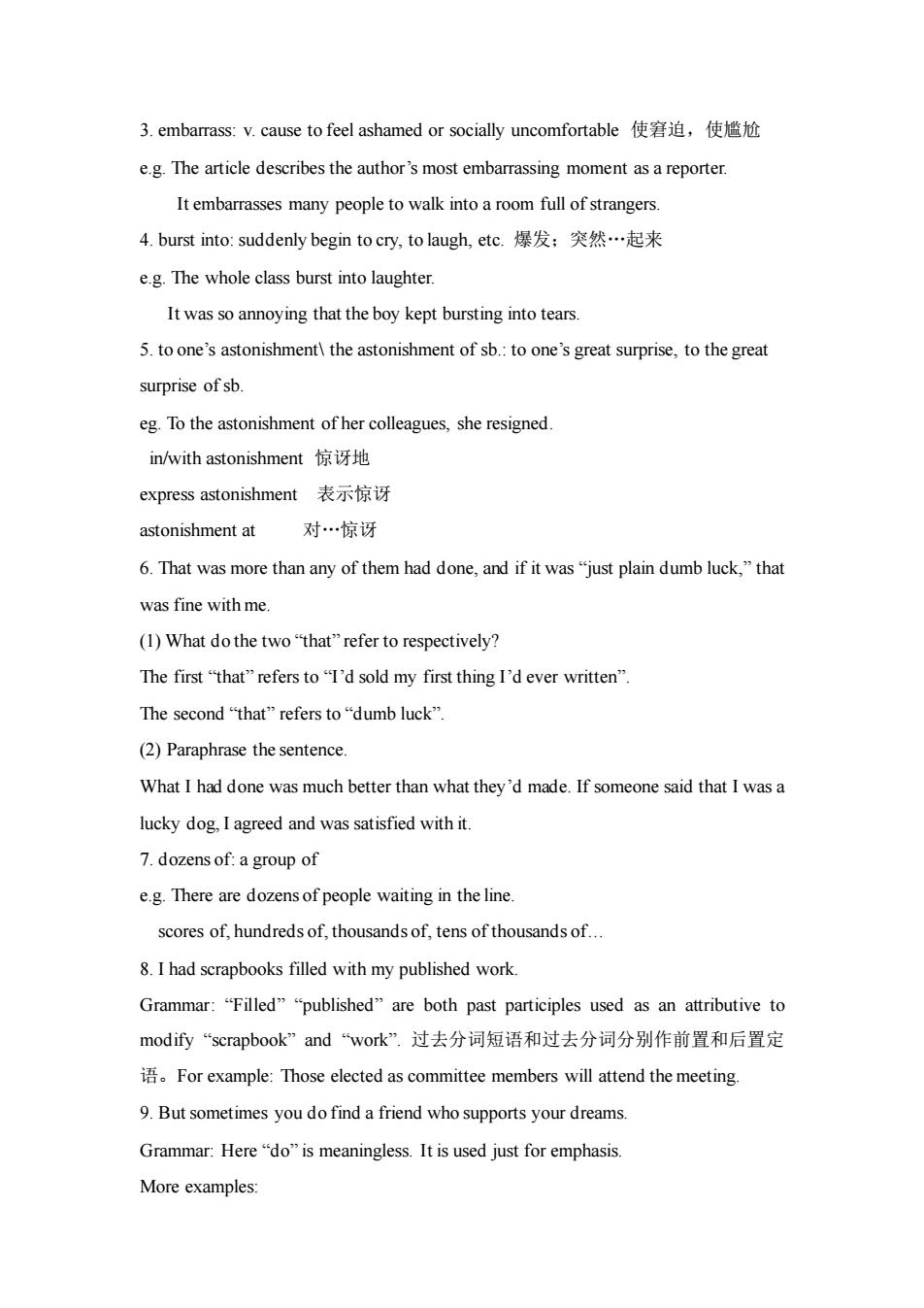
3.embarrass:.V.cause to feel ashamed or socially uncomfortable使窘迫,使尴尬 e.g.The article describes the author's most embarrassing moment as a reporter. It embarrasses many people to walk into a room full of strangers. 4.burst into:suddenly begin tocry,to laugh,.ctc.爆发:突然…起来 e.g.The whole class burst into laughter. It was so annoying that the boy kept bursting into tears. 5.toone's astonishment\the astonishment of sb.:to one's great surprise,to the great surprise ofsb eg.To the astonishment of her colleagues,she resigned. in/with astonishment惊讶地 express astonishment表示惊讶 astonishment at 对…惊讶 6.That was more than any of them had done,and if it was"just plain dumb luck,"that was fine with me (1)What do the two"that"refer to respectively? The first"that"refers to"I'd sold my first thing I'd ever written". The second“that”refers to“dumb luck”. (2)Paraphrase the sentence. What I had done was much better than what they'd made.If someone said that I was a lucky dog.I agreed and was satisfied with it. 7.dozensof:a group of e.g.There are dozensof people waiting in the line scores of,hundreds of,thousands of,tens of thousands of.. 8.I had scrapbooks filled with my published work. Grammar:"Filled""published"are both past participles used as an attributive to modify“scrapbook'”and“work”.过去分词短语和过去分词分别作前置和后置定 .For example:Those elected as committee members will attend the meeting. 9.But sometimes you do find a friend who supports your dreams. Grammar.Here"do"is meaningless.It is used just for emphasis More examples:
3. embarrass: v. cause to feel ashamed or socially uncomfortable 使窘迫,使尴尬 e.g. The article describes the author’s most embarrassing moment as a reporter. It embarrasses many people to walk into a room full of strangers. 4. burst into: suddenly begin to cry, to laugh, etc. 爆发;突然…起来 e.g. The whole class burst into laughter. It was so annoying that the boy kept bursting into tears. 5. to one’s astonishment\ the astonishment of sb.: to one’s great surprise, to the great surprise of sb. eg. To the astonishment of her colleagues, she resigned. in/with astonishment 惊讶地 express astonishment 表示惊讶 astonishment at 对…惊讶 6. That was more than any of them had done, and if it was “just plain dumb luck,” that was fine with me. (1) What do the two “that” refer to respectively? The first “that” refers to “I’d sold my first thing I’d ever written”. The second “that” refers to “dumb luck”. (2) Paraphrase the sentence. What I had done was much better than what they’d made. If someone said that I was a lucky dog, I agreed and was satisfied with it. 7. dozens of: a group of e.g. There are dozens of people waiting in the line. scores of, hundreds of, thousands of, tens of thousands of… 8. I had scrapbooks filled with my published work. Grammar: “Filled” “published” are both past participles used as an attributive to modify “scrapbook” and “work”. 过去分词短语和过去分词分别作前置和后置定 语。For example: Those elected as committee members will attend the meeting. 9. But sometimes you do find a friend who supports your dreams. Grammar: Here “do” is meaningless. It is used just for emphasis. More examples:
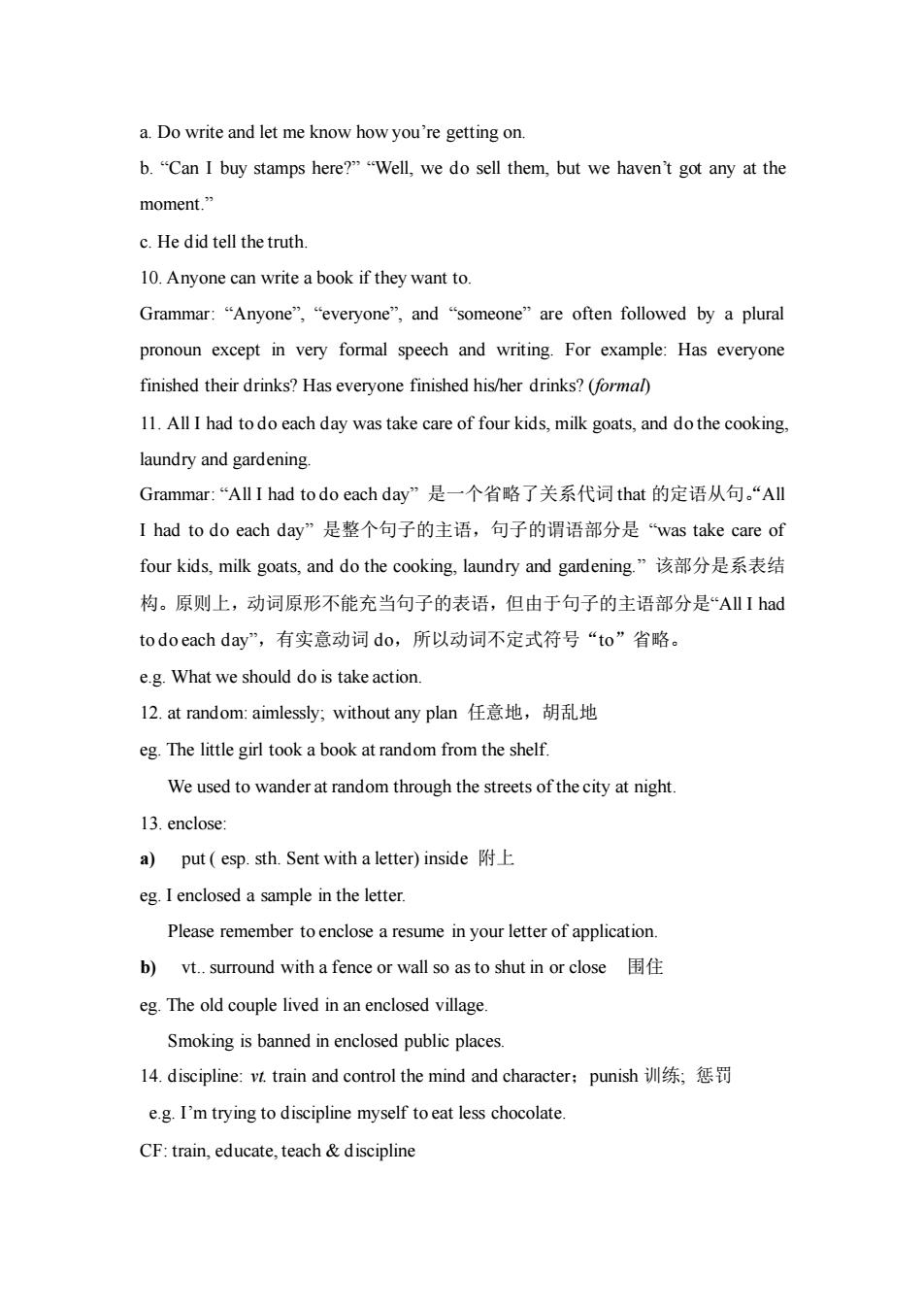
a.Do write and let me know how you're getting on. b."Can I buy stamps here?""Well,we do sell them,but we haven't got any at the moment..” c.He did tell the truth. 10.Anyone can write a book if they want to. Grammar:“Anyone'”,“everyone”,and“someone'”are often followed by a plural pronoun except in very formal speech and writing.For example:Has everyone finished their drinks?Has everyone finished his/her drinks?(formal) 11.All I had to do each day was take care of four kids,milk goats,and do the cooking. laundry and gardening Grammar:“All I had todo each day”是一个省略了关系代词that的定语从句。“Al I had to do each day”是整个句子的主语,句子的谓语部分是was take care of four kids,milk goats,and do the cooking,laundry and gardening.”该部分是系表结 构。原则上,动词原形不能充当句子的表语,但由于句子的主语部分是“All I had todoeach day”,有实意动词do,所以动词不定式符号“to”省略。 e.g.What we should do is take action. 1I2.at random:aimlessly,without any plan任意地,胡乱地 eg.The little girl took a book at random from the shelf We used to wander at random through the streets of the city at night. 13.enclose: a)put(esp.sth.Sent with a letter)inside附上 eg.I enclosed a sample in the letter. Please remember to enclose a resume in your letter of application. b)vt..surround with a fence or wall so as to shut in or close eg.The old couple lived in an enclosed village. Smoking is banned in enclosed public places. l4.discipline::.以.train and control the mind and character:punish训练,惩罚 e.g.I'm trying to discipline myself toeat less chocolate CF:train,educate,teach&discipline
a. Do write and let me know how you’re getting on. b. “Can I buy stamps here?” “Well, we do sell them, but we haven’t got any at the moment.” c. He did tell the truth. 10. Anyone can write a book if they want to. Grammar: “Anyone”, “everyone”, and “someone” are often followed by a plural pronoun except in very formal speech and writing. For example: Has everyone finished their drinks? Has everyone finished his/her drinks? (formal) 11. All I had to do each day was take care of four kids, milk goats, and do the cooking, laundry and gardening. Grammar: “All I had to do each day” 是一个省略了关系代词 that 的定语从句。“All I had to do each day” 是整个句子的主语,句子的谓语部分是 “was take care of four kids, milk goats, and do the cooking, laundry and gardening.” 该部分是系表结 构。原则上,动词原形不能充当句子的表语,但由于句子的主语部分是“All I had to do each day”,有实意动词 do,所以动词不定式符号“to”省略。 e.g. What we should do is take action. 12. at random: aimlessly; without any plan 任意地,胡乱地 eg. The little girl took a book at random from the shelf. We used to wander at random through the streets of the city at night. 13. enclose: a) put ( esp. sth. Sent with a letter) inside 附上 eg. I enclosed a sample in the letter. Please remember to enclose a resume in your letter of application. b) vt.. surround with a fence or wall so as to shut in or close 围住 eg. The old couple lived in an enclosed village. Smoking is banned in enclosed public places. 14. discipline: vt. train and control the mind and character;punish 训练; 惩罚 e.g. I’m trying to discipline myself to eat less chocolate. CF: train, educate, teach & discipline
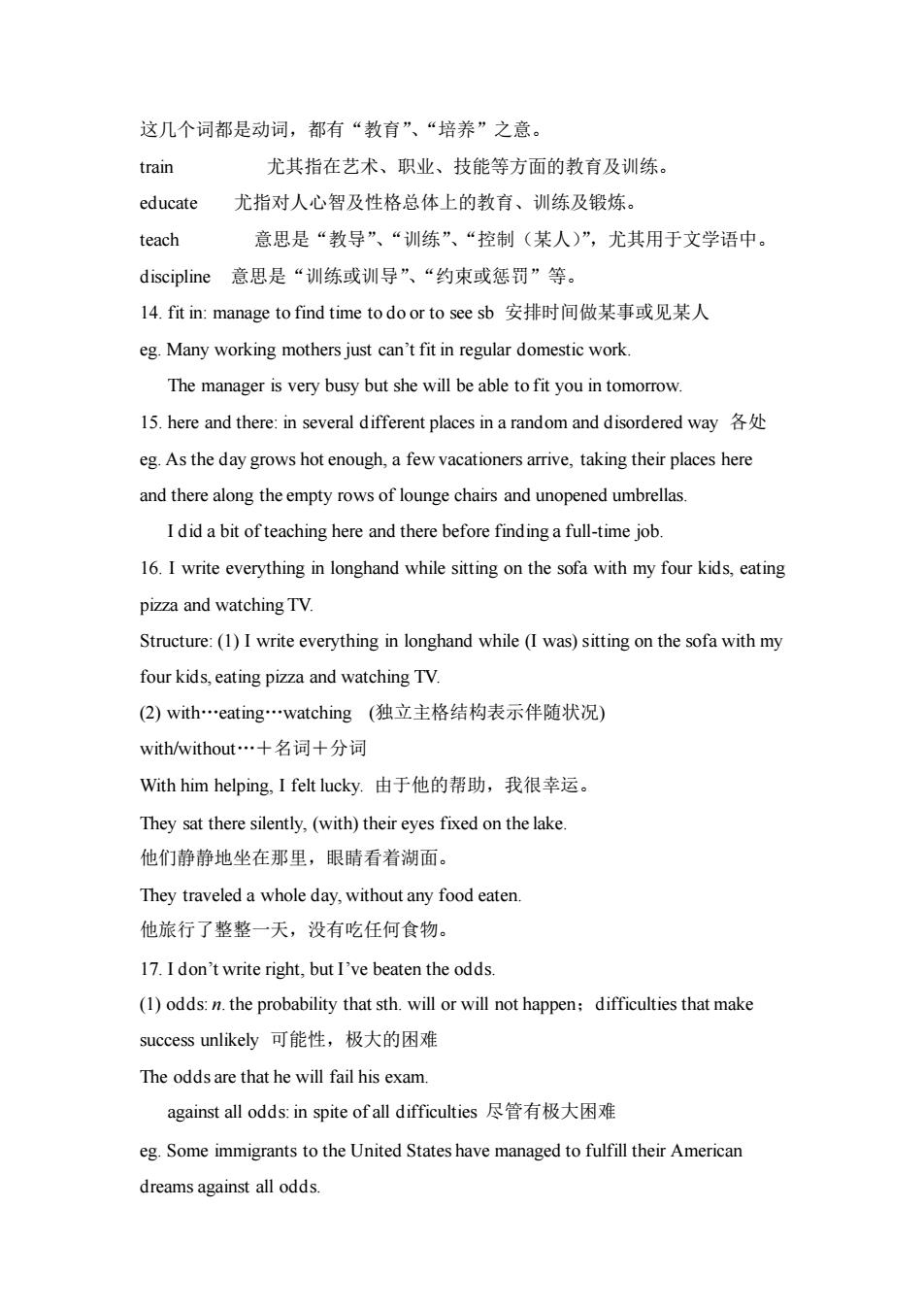
这几个词都是动词,都有“教育”、“培养”之意 train 尤其指在艺术、职业、技能等方面的教育及训练。 educate尤指对人心智及性格总体上的教育、训练及锻炼。 teach 意思是“教导”、“训练”、“控制(某人)”,尤其用于文学语中。 discipline意思是“训练或训导”、“约束或惩罚”等。 l4.fit in:manage to find time to do or to see sb安排时间做某事或见某人 eg.Many working mothers just can't fit in regular domestic work The manager is very busy but she will be able to fit you in tomorrow. 15.here and there:in several different places in a random and disordered way eg.As the day grows hot enough,a few vacationers arrive,taking their places here and there along the empty rows of lounge chairs and unopened umbrellas Idid a bit of teaching here and there before finding a full-time job. 16.I write everything in longhand while sitting on the sofa with my four kids,eating pizza and watching TV. Structure:(1)I write everything in longhand while(I was)sitting on the sofa with my four kids,eating pizza and watching TV. (2)with.eating..watching(独立主格结构表示伴随状况) with/without-…+名词+分词 With him helping,I felt lucky.由于他的帮助,我很幸运。 They sat there silently.(with)their eyes fixed on the lake. 他们静静地坐在那里,眼睛看着湖面。 They traveled a whole day,without any food eaten. 他旅行了整整一天,没有吃任何食物。 17.Idon't write right,but I've beaten the odds. (1)probability that sth.will or will not happen:difficulties that make success unlikely可能性,极大的困难 The odds are that he will fail his exam. against all odds:.in spite of all difficulties尽管有极大困难 eg.Some immigrants to the United States have managed to fulfill their American dreams against all odds
这几个词都是动词,都有“教育”、“培养”之意。 train 尤其指在艺术、职业、技能等方面的教育及训练。 educate 尤指对人心智及性格总体上的教育、训练及锻炼。 teach 意思是“教导”、“训练”、“控制(某人)”,尤其用于文学语中。 discipline 意思是“训练或训导”、“约束或惩罚”等。 14. fit in: manage to find time to do or to see sb 安排时间做某事或见某人 eg. Many working mothers just can’t fit in regular domestic work. The manager is very busy but she will be able to fit you in tomorrow. 15. here and there: in several different places in a random and disordered way 各处 eg. As the day grows hot enough, a few vacationers arrive, taking their places here and there along the empty rows of lounge chairs and unopened umbrellas. I did a bit of teaching here and there before finding a full-time job. 16. I write everything in longhand while sitting on the sofa with my four kids, eating pizza and watching TV. Structure: (1) I write everything in longhand while (I was) sitting on the sofa with my four kids, eating pizza and watching TV. (2) with…eating…watching (独立主格结构表示伴随状况) with/without…+名词+分词 With him helping, I felt lucky. 由于他的帮助,我很幸运。 They sat there silently, (with) their eyes fixed on the lake. 他们静静地坐在那里,眼睛看着湖面。 They traveled a whole day, without any food eaten. 他旅行了整整一天,没有吃任何食物。 17. I don’t write right, but I’ve beaten the odds. (1) odds: n. the probability that sth. will or will not happen;difficulties that make success unlikely 可能性,极大的困难 The odds are that he will fail his exam. against all odds: in spite of all difficulties 尽管有极大困难 eg. Some immigrants to the United States have managed to fulfill their American dreams against all odds

(2)Meaning:I am not professional,but I've succeeded in spite of the disadvantages. 18.set\put\turn one's mind on/to:be determined to do sth.:devote a lot of energy. effort and attention to dosth..决心要 e.g.A young man like you could certainly get a job if you set your mind on it. When my brother sets his mind on something,he always findsa way to achieve it. Step Four Summary 1.Important words and phrases 2.Main ideaof the text The author narrates her writing experiences.Though the process is full of difficulties,she tastes the success of writing.She encouraged the people who want to write to set their mind on writing. Step Five Homework 1.Write a composition on the topic ofMy FavoriteJob. 2.Review the text and finish the exercises on the textbook 3.Leam the text in"Reading Activity"by yourself. VI.References 1.College English Intensive Reading I,Zhai Xiangjun(ed.),Shanghai Foreign Language Education Press,2006. 2.College English Intensive Reading I,(Teacher's Book),Zhang Zengjian(ed.), Shanghai Foreign Language Education Press,2006. 3.Oxford Advanced Leamer's English-Chinese Dictionary (6th edition),Oxford university press&The Commercial Press,2004
(2) Meaning: I am not professional, but I’ve succeeded in spite of the disadvantages. 18. set\ put\ turn one’s mind on/to: be determined to do sth.; devote a lot of energy, effort and attention to do sth. 决心要 e.g. A young man like you could certainly get a job if you set your mind on it. When my brother sets his mind on something, he always finds a way to achieve it. Step Four Summary 1. Important words and phrases 2. Main idea of the text The author narrates her writing experiences. Though the process is full of difficulties, she tastes the success of writing. She encouraged the people who want to write to set their mind on writing. Step Five Homework 1. Write a composition on the topic of My Favorite Job. 2. Review the text and finish the exercises on the textbook. 3. Learn the text in “Reading Activity” by yourself. VI. References 1. College English Intensive Reading I, Zhai Xiangjun(ed.), Shanghai Foreign Language Education Press, 2006. 2. College English Intensive Reading I, (Teacher’s Book), Zhang Zengjian(ed.), Shanghai Foreign Language Education Press, 2006. 3. Oxford Advanced Learner’s English-Chinese Dictionary(6 th edition), Oxford university press﹠The Commercial Press, 2004